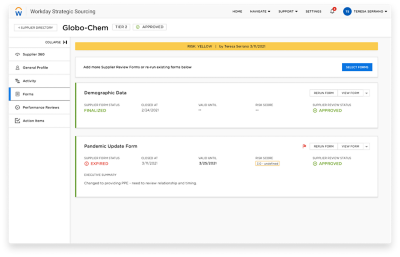LIFE SCIENCES USE CASE
High-performing procurement for the life sciences industry.
See how life sciences organizations can use Workday Strategic Sourcing to prioritize sourcing projects, safeguard supply chains, and keep costs in check.

Key use cases.
-
Stakeholder request intake—enable stakeholders to submit requests for clinical materials, such as packaging, containers, and labels, as well as services, and provide visibility throughout the request process.
-
RFx strategy and prioritization—review projects based on priority and effort level. Track cycle times, savings metrics, and team communications in one place.
-
Sourcing events—execute the sourcing processes for goods and services. Set up and publish RFx events, establish bidding activity with suppliers at scale, and determine the optimal award scenario.
-
反向auctions-manage你对货物或定价services with the use of reverse auctions, enabling suppliers to compete for bids in real time.
-
Supplier negotiations—analyze side-by-side comparisons of supplier bids and calculate savings based on the best possible business outcomes within your supply base. Use actionable data and current market trends to provide real-time feedback to suppliers on how to improve bids.
-
Contract compliance—centralize contracts in a common repository, including legal agreements, confidentiality agreements, MSA, SOW, and more, gaining visibility into your entire ecosystem of contracts. Collaborate on contract creation and revisions by seamlessly integrating with Microsoft 365®.
-
Supplier onboarding and profile management—manage onboarding and data collection activities in one place to keep suppliers up-to-date and identify new innovation and partnership opportunities.
-
Supplier performance—close the loop on the sourcing process through performance management activities, including quarterly reviews and development plans. Leverage consistent metrics to gauge performance, contract, and operational risk.
-
Savings validation—understand exactly where savings are realized and where to expect the next cost avoidance. Attribute savings to specific categories or project owners.